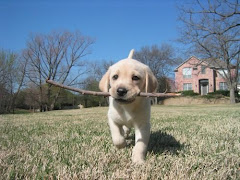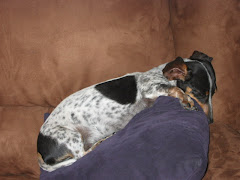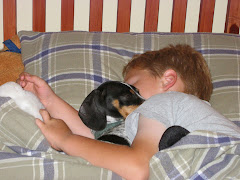The Labrador retriever has long been known as one of the most lovable dogs in the world. It also has the title of being the most popular family dog, especially for families with children. There are many fascinating little tidbits of information about the Labrador retriever that many probably don't know. They are also referred to as Labrador or just simply "Lab". In fact, they are so popular and well known that when people say, "I have a Lab", everyone knows exactly what is meant.When the Labrador retriever first came to be, it came from the Newfoundland dog and St. John's Water Dog and was called either St. John's Dog or the Newfoundland. The name was later changed to Labrador retriever. Originally, the Labrador retriever was bred to be used as a retriever and bird dog in water for waterfowl hunting. Hunters would shoot their fowl by the water and the Labrador would go in the water and retrieve it. To this day, the Lab loves water and being in water.There have been some famous Labrador retrievers in the world. One such dog, Endel, is a yellow Labrador retriever that has caught the eye of the media due to his bravery and intelligence. After much training, Endel became an assistance dog for Allen Parton, and ex-Royal Navy Chief Petty Officer, who was in a wheelchair. When Allen was hit by a passing car and knocked out of the wheelchair in 2001, Endel pulled him to the recovery position, covered him with a blanket, retrieved his cell phone and went to a nearby hotel to get someone to come to Allen's aid.Endel is the recipient of many awards such as the Blue Peter Badge and the PDSA Gold Medal for bravery and dedication to duty. He was also named "Dog of the Millennium" by Dogs Today magazine readers. Endel has many talents such as being able to respond to over one hundred instructions, loading and emptying the washing machine, putting in and removing a card in the ATM machine and putting it back in Allen's wallet. This Labrador is certainly an incredible animal, and a fantastically dedicated pet.There is also Jake, a black Labrador retriever, who risked his won life by going through the smoke-filled debris at the World Trade Center to look for survivors. Jake also helped search for victims from Hurricane Katrina.The Memphis Mad Dogs had a black Labrador named Alien as their mascot. Alien would run on the field after each kickoff and bring back the kicking tee. He was the highlight of many games.The Labrador has also been crossed with a poodle to create what they call a "designer dog": the Labradoodle. This unusual mix has pleased many dog owners.





2 comments:
PURE GOLD
When Endal, a quiet, unassuming yellow Labrador, won PDSA’s Gold Medal in 2003, it was another remarkable episode in a remarkable life. We tell his story here and that of the man whose world he helped
to transform.
On a late autumn day in 2002, a Labrador, smart in a
purple jacket, his intelligence shining through in his
bright-eyed alertness, stood attentively beside a man in a wheelchair. Before them a ceremony was taking place. The assembled guests were told how, after the man had been knocked from his wheelchair by a reversing car, the dog rolled his companion’s unconscious form into the recovery position, draped a blanket over him, nudged his mobile phone close to his face and then went to fetch help. Actions that many people might not have had the composure and the calm sense of purpose to carry out.
Afterwards, HRH Princess Alexandra presented the Labrador with the PDSA’s Gold Medal, awarded to animals that have shown outstanding devotion to their duties in time of peace. For his astonishing response to the accident, he became one of only three dogs to receive the Medal since its introduction. The dog’s name was Endal; his companion was Allen Parton. What had brought them together, and what had brought them to this ceremony, were a series of events that were as despairing as, eventually, they were hope-filled.
A lifetime lost
When Allen Parton, a weapons electronics officer in the Royal Navy, waved goodbye to his wife, Sandra, and their two children, Liam and Zoe, he was also bidding farewell to life as he had known it. It was 1991, and Allen was heading out to the Gulf War. He was, of course, fully aware of the dangers that lay ahead; but he was equally sure that experience and good fortune would see him return home untouched and unharmed.
Allen was wrong; Allen got unlucky. A month after he arrived, his military car was wrecked in an accident and Allen’s body with it. He woke six weeks later in a British military hospital, his right hand side devoid of feeling and his mind even number. His memory had been so horribly obliterated by the injuries he sustained that he was unable to recognise Sandra and had no recollection of his marriage or his children. He had to be introduced to his family. The simplest of words – bed, chair – deserted him. He spoke, if at all, as he remembered: in disjointed, meaningless fragments. Imprisoned by his wheelchair, trapped by his fumbling speech, and dispossessed of his own past, Allen saw no reason to have faith in the future. Twice he tried to take his own life.
After five years of hospitalisation and rehabilitation, Allen at last returned to his home in Hampshire, a stranger to the person he had once been, and raging at his fate. By his own admission, Allen was all too willing to share his anger and bitterness with those around him. "I refused to accept I was disabled and I’m ashamed to say I was pretty much horrible to everyone," he admitted.
An encounter
Sandra, who gave up her job as a nurse to care for Allen, had volunteered as a puppy walker for Canine Partners, an organisation that trains dogs to help disabled people enjoy a greater degree of independence. One morning, in the summer of 1997, the bus that had been due to ferry Allen to the day centre he attended failed to turn up. Rather than leave her husband to brood at home, Sandra took Allen with her to the Canine Partners training centre.
There Allen sat, his wheelchair parked in a corner, as self-conscious and withdrawn as he always was in public. Until, that is, his eye caught a young dog, resting from a training session. The dog wandered over to the wheelchair, accepted Allen’s offer of a welcoming pat on the head and promptly dived on to his lap. It was Endal. Allen’s life was about to emerge from night and into the sun.
A partnership is born
Everyone saw that there was a clear and instant bond between Endal and Allen, something instinctive and rooted in the way they interpreted each other’s needs. After a few more meetings between the two – it was difficult to tell who anticipated Allen’s visits to the training centre the more – Allen decided to apply to take Endal as an assistance dog. It was only while the forms were being completed that Allen understood and accepted the importance of the psychological step he was taking: "I had to describe my disabilities and this was the first time I had admitted there was something wrong with me. It was a cathartic experience. Until I met Endal, I was in the depths of despair. Now I suddenly saw a chink of light."
Life begins anew
With Allen still struggling as much with his word recollection as his mobility, Endal’s ability to read the sign language with which Allen was sometimes forced to communicate was central to their relationship. A pat on Allen’s head meant, and was understood as, "fetch my cap". A touch on Allen’s cheek and Endal was off to bring him his razor case. Hands held up? A second later Allen’s gloves appeared. ‘Tugs’ were added to everything – doors, cupboards, clothes drawers, the toilet seat – in the Parton house that needed opening or closing or lifting so that Endal could help Allen get dressed, wash and manage the domestic chores.
Endal was soon as adept at shopping as he was around the house. Allen simply issued the appropriate instructions from his wheelchair – cereal, soup, tins of tomatoes, bread – and Endal would unfailingly nose it from the shelf and drop it into the shopping basket. He even helped to pay. Once Allen had tapped in his PIN, Endal would gently retrieve the money and card from the cash dispenser.
The differences that Endal brought to Allen’s everyday world weren’t just practical, however impressive his abilities to sniff out a bargain at the supermarket. They were therapeutic too. Where five years of intensive speech coaching had seen little progress, Allen’s urge to talk to Endal mean that he was becoming ever more articulate, his vocabulary as broad as it was before the accident. Once Allen, embarrassed at his inability to remember words let alone names, would shy from social contact. Now Endal gave him the confidence to re-engage with the world that once had felt so alien and intimidating. "Endal provides a talking point," explained Allen. "People stroke and chat about him which helps me to socialise."
Perhaps most importantly of all, Endal restored Allen to his family, allowing him the emotional strength needed to rediscover and renew the bonds of human love. "Life will never be the same again but, thanks to Endal, Allen has a second chance," said Sandra. "As do we. The children lost their old dad but Endal has given them a new one." Recently, Allen and Sandra took their wedding vows again.
Fame
A dog as talented as Endal is a difficult secret to keep. His prowess at the cash machine was spotted by a journalist from a national newspaper. After that the media floodgates opened wide. Reporters and film crews from around the world have queued up to watch and marvel as Endal, wallet in mouth, picks up Allen’s prescription at the chemist’s or operates the electronic doors on a train.
What really threw the spotlight on Endal, however, was the story of the heroics for which he was awarded the PDSA’s Gold Medal. Invited to attend a stand at Crufts in 2001, the pair had been exercising in the car park afterwards when the vehicle, unseen by Allen until the last second, struck him and threw him from his wheelchair. Endal’s resolve and quiet control made headline news and won him that most prestigious of animal awards.
The future
Endal is now twelve years old. There will come a time when he will be too old to carry out his duties, however strong and faithful the urge to do so. When that happens, Allen will be there to look after him, repaying what he acknowledges to be an unrepayable debt.
The day in the car park that saw Endal save Allen’s life by grasping his coat and pulling him, unconscious, into the recovery position was truly remarkable. What is almost as remarkable is that Endal has been saving Allen’s life, precious piece by precious piece, each and every day, before and since.
This was obviously copied and pasted. Leave a link where you got it from. Two links above this it has the SAME article
Post a Comment